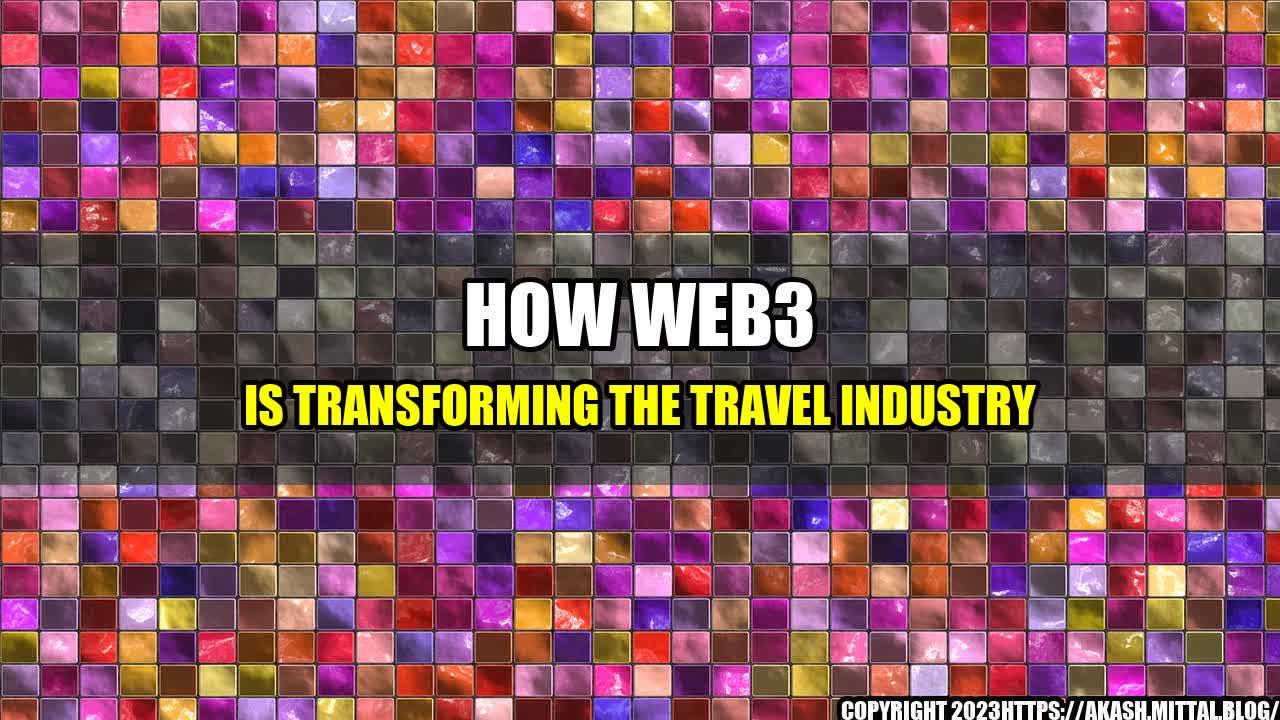
As a passionate traveler, I have always been fascinated by the ways in which technology has changed the way we explore the world. From booking flights and accommodation to sharing photos and recommendations online, the internet has made travel easier and more accessible than ever before. However, with the rise of Web3 technology, we are now seeing a new era of innovation that has the potential to revolutionize the travel industry in ways we never thought possible.
Before we delve into the impact of Web3 on the travel industry, it's important to understand what exactly Web3 is. Put simply, Web3 is the next generation of the internet, characterized by decentralized networks, blockchain technology and a greater focus on privacy and security. Unlike Web 1.0 and 2.0 that were driven by centralized corporations such as Google and Facebook, Web3 is built on open-source protocols and peer-to-peer networks that allow for greater autonomy and user control.
So, how exactly is Web3 transforming the travel industry? Here are just a few of the ways in which this technology is changing the way we travel:
One of the core principles of Web3 is decentralization, which means that data and power are distributed across a network of users rather than controlled by a single central authority. In the context of travel, this means that travelers have greater control over their own data and can rely on decentralized networks to ensure greater transparency and trust when it comes to booking accommodation, transportation and experiences. For example, platforms like LockTrip and Winding Tree are using blockchain technology to offer decentralized booking systems that allow travelers to book accommodations and flights without the need for intermediaries like Expedia or Booking.com.
Web3 also offers the potential for enhanced personalization when it comes to travel. By leveraging user data and machine learning algorithms, travel platforms can deliver personalized recommendations and experiences based on each individual traveler's unique preferences and interests. For instance, platforms like Cool Cousin and Withlocals use AI and machine learning to match travelers with locals who can offer personalized recommendations and help them discover the hidden gems of a destination.
Finally, Web3 is also creating new opportunities for community building in the travel space. Decentralized travel platforms like Ripple and Horizen are using blockchain technology to create travel networks that allow travelers to connect with each other, share resources and experiences and even earn rewards for contributing to the network. This not only fosters a greater sense of community among travelers, but also creates new opportunities for collaboration and innovation in the industry.
While the potential of Web3 in travel is certainly exciting, it's also important to look at real-world examples of how this technology is already being implemented. Here are just a few examples:
LockTrip is a decentralized travel platform that allows travelers to book accommodations and flights without intermediaries. By leveraging blockchain technology to eliminate the need for intermediaries like Expedia and Booking.com, LockTrip is able to offer significantly lower prices for travelers while also ensuring greater transparency and security. According to the company, travelers can save up to 60% on their travel expenses by using LockTrip.
Cool Cousin is a decentralized travel platform that connects travelers with local insiders who can offer personalized recommendations and advice. By leveraging AI and natural language processing (NLP), Cool Cousin is able to match travelers with locals who share similar interests and can provide customized recommendations based on their preferences. The company also offers a native cryptocurrency called CUZ that can be used for transactions within the platform.
Winding Tree is a decentralized travel platform that uses blockchain technology to create a private, secure and transparent network for travel distribution. By eliminating intermediaries and allowing suppliers and consumers to transact directly, Winding Tree is able to reduce costs and increase efficiency in the travel space. The company is already partnering with several major airlines and hotel chains to offer decentralized booking systems.
Web3 technology has the potential to transform the travel industry in ways we never thought possible. From greater transparency and trust to enhanced personalization and community building, the possibilities are endless. However, as with any new technology, it's important to approach Web3 with caution and ensure that privacy and security are prioritized. By embracing Web3 and the principles of decentralization and user control, we can create a travel industry that is more open, democratic and accessible to all.
#Web3 #TravelIndustry #Decentralization #Blockchain #Personalization #CommunityBuilding
Technology and Travel
Curated by Team Akash.Mittal.Blog
Share on Twitter Share on LinkedIn